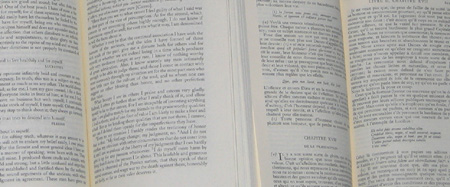A Year of Montaigne
In the course of writing up Pierre Bayard’s How to Read Books You Haven’t Read, I needed (by my own lights) to check out a quotation from Montaigne. I can’t speak for the original, but the English translation offers extremely rudimentary annotation. The citations of Montaigne refer to Donald Frame’s mid-century translation, giving only the book’s title and a page number. The name of the essay in question would have been helpful. Although Frame’s translation has been revived for the Everyman’s Library edition, the pagination is evidently quite different. It took a while to discover that the essay that I wanted was one of Montaigne’s longest, “On Presumption.”
It was really quite shaming. Why don’t I know Montaigne – know him? Every time I open the Essays, I’m struck by his wise and sympathetic character. When he does not remind me of myself — “I flee command, obligation, and constraint. What I do easily and naturally, I can no longer do if I order myself to do it by strict and express command.” — he makes his very flaws sound charming — “Of music, either vocal for which my voice is very inept, or instrumental, they never succeeded in teaching me anything.” His decent skepticism, and his insistence that the habit of putting himself at the center of Creation is a helpless vice that he bitterly regrets, mark him as astonishingly modern, far more up-to-date and congenial than men born hundreds of years later. Even the peripatetic and unpredictable course of his discussions, innocent as they are of the rigors of Cartesian symmetry, breathes the free-for-all air of open possibility that our jaded sensibilities crave. Montaigne is by far the most ancient “authority” cited in M Bayard’s book.
As I lamented the disappointments of my own education, I read about Montaigne’s —
I gladly return to the subject of the ineptitude of our education. Its goal has been to make us not good or wise, but learned; it has attained this goal. It has not tuahgt us to follow and embrace virtue and wisdom, but has imprinted in us their derivation and etymology. We know how to decline virtue, if we cannot love it. If we do not know what wisdom is by practice and experience, we know it by jargon and by rote. With our neighbors, we are not content to know their family, their kindred, and their connections; we want to have them as friends and form some association and understanding with them. Education has taught us the definitions, divisions, and partitions of virtue, like the surnames and branches of a genealogy, without any further concern to form between us and virtue any familiar relationship and intimate acquaintance. It has chosen for our instruction not the books that have the soundest and truest opinions, but those that speak the best Greek and Latin; and amid its beautiful words, it has poured into our minds the most inane humors of antiquity.
— and it occurred to me that nothing could better complement the freshman art-history survey that used to be (and still is, I hope) the covert foundation of every student’s education in the humanities than a year (in two semesters) spent reading Montaigne. Nothing but Montaigne! Nothing but Montaigne, that is, and all the classical authors to which his Essays offer so inviting an introduction. The entire education, in other words, of a first-class Renaissance mind.
Montaigne isn’t much taught in English. Everybody gets an essay or two in the course of discovering essays (again, I hope that I speak for the present as well as the past), but the selection is necessarily narrowed to Montaigne at his most rational and least personal. And the focus of such lessons is always on the clarity of exposition; the essays are held up, after all, as models for students, not as personal reflections. Certainly Montaigne is not the backbone of liberal-arts education that he ought to be.
A year of Montaigne might be very boring for poor freshmen, but the stuff would almost certainly stick with them until better times.


I will gladly take your lead and the challenge to spend a year with Montaigne and his Essais which title I translate in my poor French as “Attempts”. For the moment, which might be a rather long moment if moments can be months, I will be in English with Montaigne but by this time next year I should be able to begin the French. What better goal could I have than to emulate Montaigne as he is described in the Wiki entry, “…known for popularizing the essay as a literary genre. He became famous for his effortless ability to merge serious intellectual speculation with casual anecdotes and autobiography…”, what better goal, indeed. Having taken the freshman intro to Art History using Janson’s History of Art in the Fall of 1965 but having not gone any further with any substantial liberal arts work due the nature of a course of technical undergraduate and graduate education and employment that has ranged from Chemical Engineering through Biochemistry, Physiology and Pharamcology, and finally ending with an undergraduate degree in Computer Science twenty years ago perhaps now that I am at my leisure in my new occupation as a mechanized mahoot I might profitably take up a course of study using, as you suggest, Montaigne as a foundation.
Lysdexia, do you know the seven danger signals of this killer disease? Well, I do and all too well. Pharamcology above which should most obviously be Pharmacology I could pass off as simply fat fingered typing but that would be a lie. I am surprised that no one else has commented on this post. Perhaps I’m the only nerd on the block trying to gain some depth in the liberal arts who has never been exposed to Montaigne. His work seems quite interesting to me. I doubt that I’ll be bored.